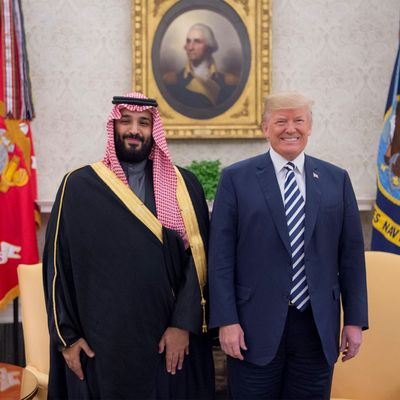
Two days ago, President Trump declared the United States was “locked and loaded” for a retaliatory strike on Iran for its attack on a Saudi oil facility. The United States was “waiting to hear from the kingdom” for guidance on “what terms we would proceed.” It is rather odd that the legendarily isolationist president would put American military power at the disposal of a foreign power.
The American-Saudi relationship famously dates to a 1945 meeting between Franklin Roosevelt and King Saud aboard a battleship in the Suez canal. The alliance was founded on Saudi Arabia’s possession of massive reservoirs of oil. But Saudi Arabia’s value has diminished since then, and the United States is now a net exporter of oil.
Trump himself used to frequently rail against American support for the kingdom. He expressed the same disdain for Saudi Arabia as he did for all American allies — they were a bunch of leeches getting rich off American generosity:
But now Trump has come around to a different line of thinking. The Saudis don’t owe America for defending them. Americans owes the Saudis for the privilege of selling them advanced weaponry. “They’ve been a great ally,” gushed the president,
They spend $400 billion in our country over the last number of years. Four hundred billion dollars. That’s a million and a half jobs. And they’re not ones that, unlike some countries, where they want terms; they want terms and conditions. They want to say, “Can we borrow the money at zero percent for the next 400 years?” No. No. Saudi Arabia pays cash.
It’s true that Saudi Arabia purchases weaponry from the United States, though the actual amount is nowhere near $400 billion (which would be more than half the Pentagon’s annual budget). But this transaction is not an act of generosity for hard-pressed American arms manufacturers. The Saudis are being given access to advanced arms that many countries would love to have.
The Saudis have been purchasing American weapons — with cash — for decades. That’s the nature of the relationship. It’s not clear why Trump has decided to stop seeing U.S. arms sales to Saudi Arabia as a favor to the Saudis and start seeing them as a favor to the U.S.
What makes Trump’s logic so peculiar is that it turns the mechanism through which the alliance works into its rationale. We used to sell weapons to Saudia Arabia because we needed to secure their oil. Now we supposedly need to defend them because they buy our weapons.
The largest mystery hovering over Trump’s reversal is not how much the Saudis are paying the United States, but how much they’re paying Trump personally. The Saudis spend extravagant sums of money at his hotels in Washington and New York. Earlier this summer, a Saudi entourage of more than two dozen stayed at Trump’s resort in Scotland. These are just some details that have leaked out piecemeal. The overall scope of Trump’s financial ties to the kingdom are opaque, because Trump, with the support of the conservative movement and Republicans in Congress, refuses to disclose basic financial information.
It’s certainly easy to imagine that Saudi lobbyists persuaded Trump to reverse his longstanding skepticism of the alliance through sheer force of argument. Trump changes his mind all the time, not always through money changing hands.
In the meantime, Trump is rattling his saber on behalf of an ally that whose value once trashed, and which is now paying him unknown sums, on the basis of a rationale that on its face makes no sense at all.






























